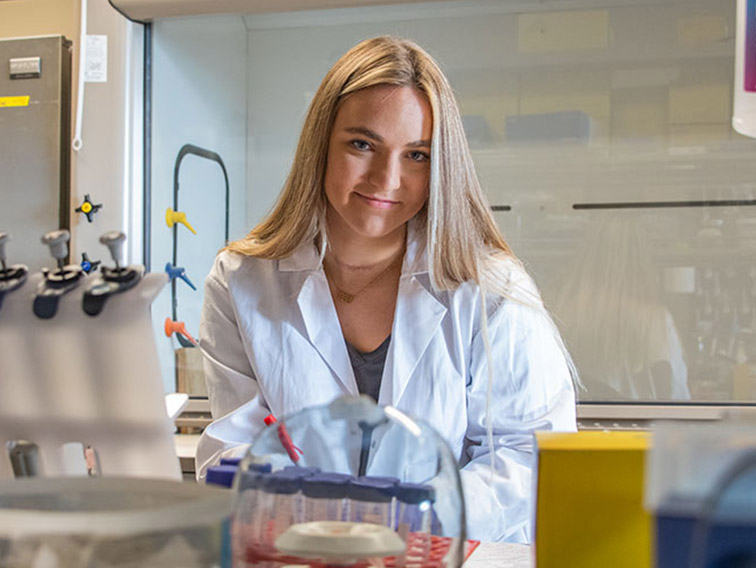The information presented on this page may be dated. It may refer to situations which have changed or people who are no longer affiliated with the university. It is archived as part of Mississippi State University's history.
Mackenzie Ripper, senior poultry science major, is no stranger to a challenge or change in life. It was a challenge for the North Carolina native to move over 750 miles away from home to attend MSU. But her first visit to the land-grant university inspired her to delve into the unknown and explore what her future could be.
Likewise, when the senior received a thyroid cancer diagnosis, she kept forging ahead, dedicated to finishing her undergraduate research experience.
"I had to miss a lot of school, in August, so I could have surgery and be treated," Ripper said. "I have had my round of radiation, and now I am on supplements, and I feel better."
Ripper has continued her hard work and not let the challenges that presented her this year deter her from her goals. Facing the unknown has empowered her as she continues her path toward achieving her goals.
Aspiring to be a veterinarian, Ripper desired hands-on learning experiences to supplement skills and knowledge she had learned in her major.
She applied to the College of Agriculture and Life Sciences Undergraduate Research Scholars Program and was accepted to work under the direction of Dr. Li Zhang, assistant research professor and MAFES scientist in the Department of Poultry Science. Together, they began to research how to detect different bacterial pathogens within the poultry industry.
"Dr. Zhang has been so helpful and attentive with making sure I understand how to do this research," Ripper said. "I had never worked in a lab before, so, I took the first months to learn how everything worked and get acquainted with the science behind it. Then in December 2020, I delved into the project."
Ripper learned how to identify Campylobacter jejuni, a pathogen found in poultry that is a common source of food poisoning. The goal behind the research is to detect the pathogen at the farm level to combat and treat it at the source.
"If we can detect these pathogens on the farm, this would provide rapid, sensitive and specific detection of foodborne pathogens before the birds are processed," Ripper said. "This would save time and money while allowing farmers to begin preventative measures much faster in order to keep both birds and consumers safe."
Ripper analyzed DNA extractions to identify the pathogens through the loop-mediated isothermal amplification, or LAMP, testing method. The innovative method had not been used to study pathogens within the poultry industry. While this method did detect pathogens, Ripper found that the LAMP test was not the ideal approach for successful replication in an industry setting.
"I found that almost any cross contamination with the LAMP assays would interfere with the accuracy of the test," Ripper said. "The samples we used needed to be nearly pure DNA extractions, which is not realistic when thinking about conducting this type of test on a farm."
The preliminary data uncovered the high risk of cross-contamination, despite taking precautionary measures. Testing this method showed researchers different approaches that would need to be explored to effectively monitor and detect farm-level pathogens.
Ripper is analyzing the preliminary data and helping Zhang formulate strategies for future exploration. Both student and teacher expressed that this research gave them impactful insight on the meticulous details and strategies that can be incorporated into future approaches for this research. Ripper also noted that the research provided the hands-on opportunity she sought, delivering insight and experience.
While she plans to take a break after graduation, she is still applying her hardworking attitude to searching for internships or opportunities to explore with connections she has made through her time at Mississippi State.
"The department has been so helpful throughout all of this. Dr. Zhang has been so interactive and helpful throughout my research and the faculty and staff have been understanding," Ripper said. "I have been talking to people in the department and making connections that I am hopeful will lead into potential work or internship opportunities in the future."
This research was funded by the Mississippi Agricultural and Forestry Experiment Station's Special Research Initiative and the Undergraduate Research Scholars Program.

